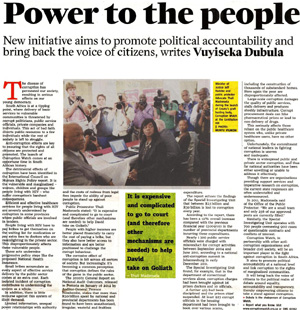|
Getting your Trinity Audio player ready...
|

The disease of corruption has permeated our society, resulting in serious effects on our young democracy.
South Africa is at a tipping point, where delivery of basic services to vulnerable communities is threatened by corrupt politicians, public service officials, private companies and individuals. This act of bad faith diverts public resources to a few individuals while the rest of society is left to struggle.
Anti-corruption efforts are key to ensuring that the rights of all citizens are protected and promoted. The launch of Corruption Watch comes at an opportune time in South African history.
The detrimental effects of corruption have been identified in the International Council on Human Rights Policy report. It is the vulnerable and marginalised – women, children and groups like people living with HIV – who suffer corruption’s harshest consequences.
Efficient and effective healthcare services for people living with HIV are severely undermined by corruption in some provinces where public officials are involved in tenders.
People living with HIV have to pay bribes to get themselves on the waiting list for medication or pay extra fees to doctors who are moonlighting in the private sector. This disproportionately affects these vulnerable people.
These acts undermine progressive policy steps like the proposed National Health Insurance.
Small bribes accumulate as every aspect of effective service delivery by the public sector comes at an extra cost. Each isolated incident of corruption contributes to undermining the system as a whole.
In addition, there is little recourse against this system of illicit demand.
Limited information, unequal power relationships with authority and the costs of redress from legal fees impede the ability of poor people to stand up against corruption.
Public Prosecutor Thuli Madonsela stated: “It is expensive and complicated to go to court (and therefore other mechanisms are needed) to help David take on Goliath.”
People with higher incomes are better placed financially to carry the cost of paying a bribe, but they also have better access to information and are better positioned to challenge the corrupt behaviour.
The corrosive effect of corruption is felt across all sectors of society. But increasingly, it’s becoming a common perception that corruption defines the rules of the game in the public sector.
The 2010/11 General Report on National Audit Outcomes, released in Pretoria on January 16 2012 by Auditor-General Terence Nombembe, states that more than R20 billion spent by national and provincial departments has been found to have been unauthorised, irregular, wasteful and fruitless expenditure.
The report echoes the findings of the Special Investigating Unit that between R25 billion and R30 billion is lost to corruption every year.
According to the report, there has been a 12% overall increase compared with the previous financial year (2009/10) in the number of provincial departments incurring these expenditures.
Nearly 1 300 public service officials were charged with misconduct for corrupt activities between September 2004 and June 2011, according to a national anti-corruption summit in Johannesburg in early
December 2011.
The Special Investigating Unit found, for example, that in the department of correctional services alone, corruption charges had been brought against 26 prison doctors and 10 officials.
A further 423 had been disciplined and the prison chief suspended. At least 923 corrupt officials in the housing department had been brought to book over various scams, including the construction of thousands of substandard homes. Here again the poor are disproportionately affected.
Large-scale corruption damages the quality of public services, stalls delivery and produces shoddy infrastructure. Corrupt procurement deals can hike pharmaceutical prices or lead to non-delivery of drugs.
This seriously affects those reliant on the public healthcare system who, unlike private healthcare users, have no other option.
Unfortunately, the commitment of national leaders in fighting corruption is uneven and inadequate.
There is widespread public and private sector corruption, and thus far national authorities have been either unwilling or unable to address it effectively.
Though there are organisations providing support services and imperative research on corruption, the current state responses are often understaffed and underresourced.
In 2011, Madonsela said of the Office of the Public Protector: “We are a small team and only 256 of our approved posts are currently filled.”
Similarly, the Special Investigating Unit operates with 700 people overseeing 900 cases of questionable contracts and conflicts of interest.
Corruption Watch, in partnership with other anti-corruption organisations and broader civil society, will be an important player in the fight against corruption in South Africa.
It aims to promote political accountability at a national level and link corruption to the rights of marginalised communities.
It will bring back the voice of citizens to the political realm of debate around equality, accountability and transparency, thereby empowering citizens to take a stand against corruption.
Vuyiseka Dubula is the chairperson of Corruption Watch. Report what you know. Visit www.corruptionwatch.org.za or SMS 45142. This article originally appeared in the City Press on 29 January 2012.

A new initiative aims to promote political accountability and bring back the voice of citizens, writes Vuyiseka Dubula in the City Press.



